 Backend Development
Backend Development
 PHP Tutorial
PHP Tutorial
 Detailed explanation of the use of Laravel 5.5 core architecture
Detailed explanation of the use of Laravel 5.5 core architecture
Detailed explanation of the use of Laravel 5.5 core architecture
This time I will bring you a detailed explanation of the use of the Laravel 5.5 core architecture. What are the precautions when using the Laravel 5.5 core architecture? Here are practical cases, let’s take a look.
Preface
This article mainly introduces to you the relevant content about the core architecture of Laravel 5.5, and shares it for your reference and study. I will not say anything below. Enough said, let’s take a look at the detailed introduction.
# method passes in the component name, the framework will automatically instantiate it, and you can directly Use
For example, the most commonly used request object
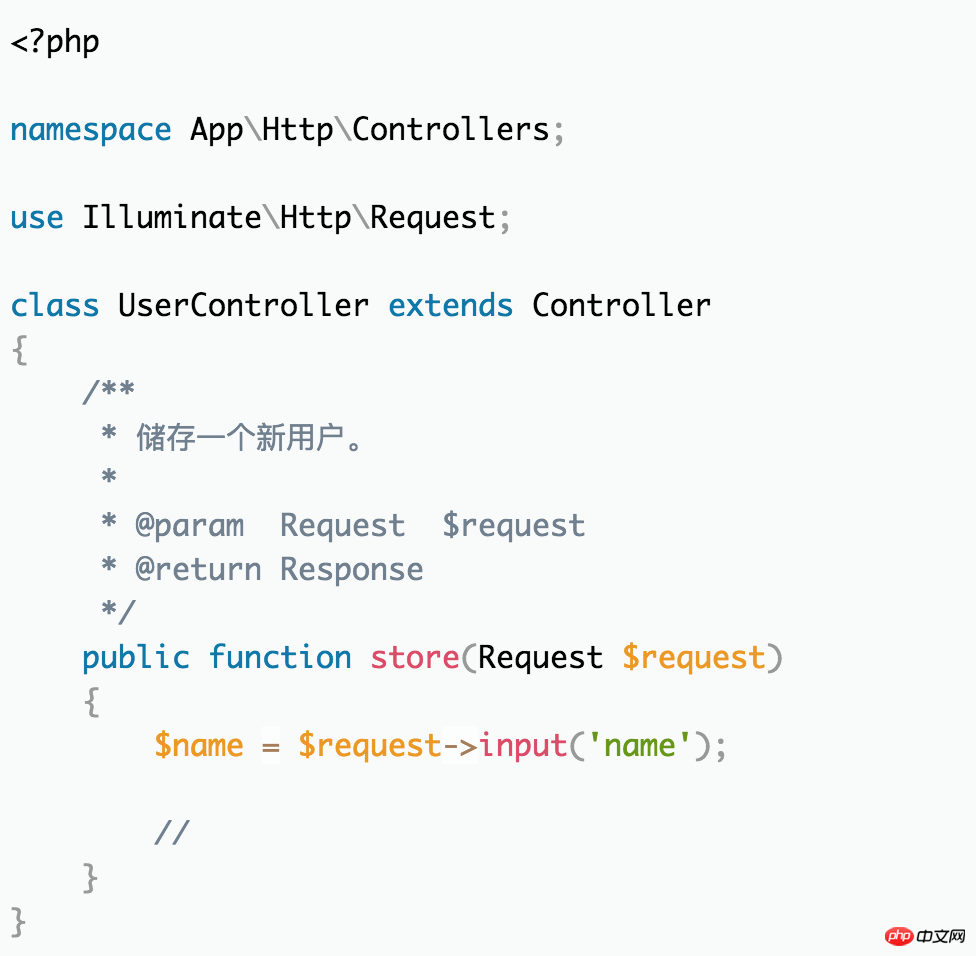
2, service container
In fact, the core of Laravel is an IoC container. The core of Laravel itself is very lightweight and does not have any magical or substantial application functions. Various functional modules used by many people, such as Route (routing), Eloquent ORM (database ORM component), Request (request), Response (response), etc., are actually provided by class modules that have nothing to do with the core. The process from registration to instantiation of these classes to finally being used by you is actually the responsibility of Laravel's service container.
The service provider is mainly divided into two parts, register (registration) and boot (boot, initialization)
3. Service provider
For a class to be extracted by a container, it must first be registered with the container. Since Laravel calls this container a service container, if we need a service, we must first register and bind the service to the container. Then the thing that provides the service and binds the service to the container is the service provider.
4. Add your own class to the IOC container
##4.1. Create a new validate class
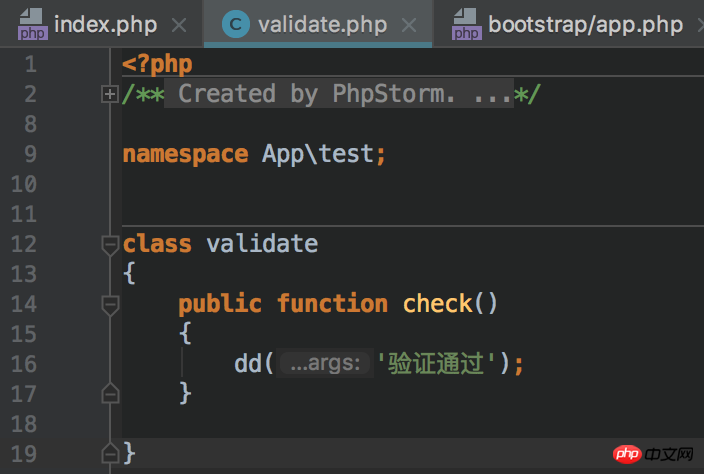
4.2. Create a new validateProvider

1 2 3 4 5 6 7 8 9 10 11 12 13 14 15 16 17 18 19 20 21 22 23 24 25 26 |
|
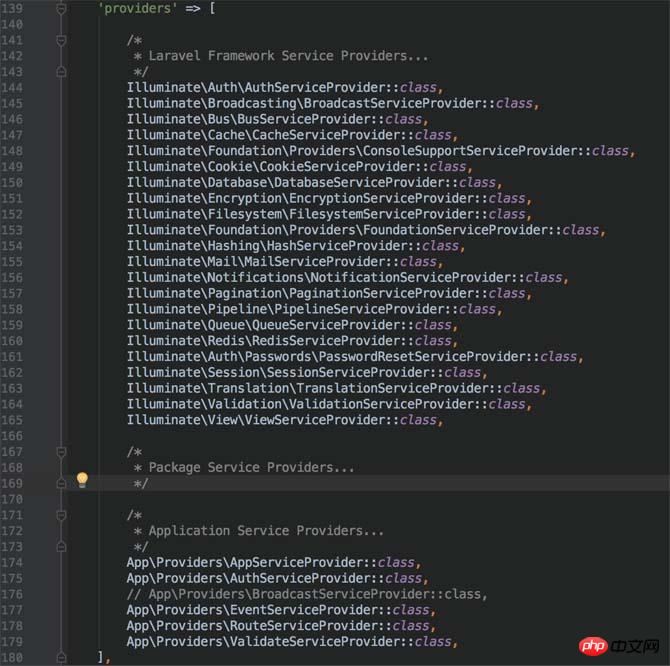 ##4.5. Use
##4.5. Use
 4.6. Success!
4.6. Success!

facade is used to provide a unified interface. For example, no matter which cache you use, redis or memcache, the client can use the cache::get() method to obtain the value. As for whether you use redis or memcahe, it depends on which one you have bound in the service provider. The implementation of cache::get() is to inherit the Facade method getFacadeAccessor and return the key value you bind in the container, such as cache, and then the Facade class will use php magic variables
callstatic(), callstatic The logic will parse the service bound to the cache from the container, which is who the service provider mentioned earlier is bound to.## in config/app.php
#5.2. This class only returns one mailer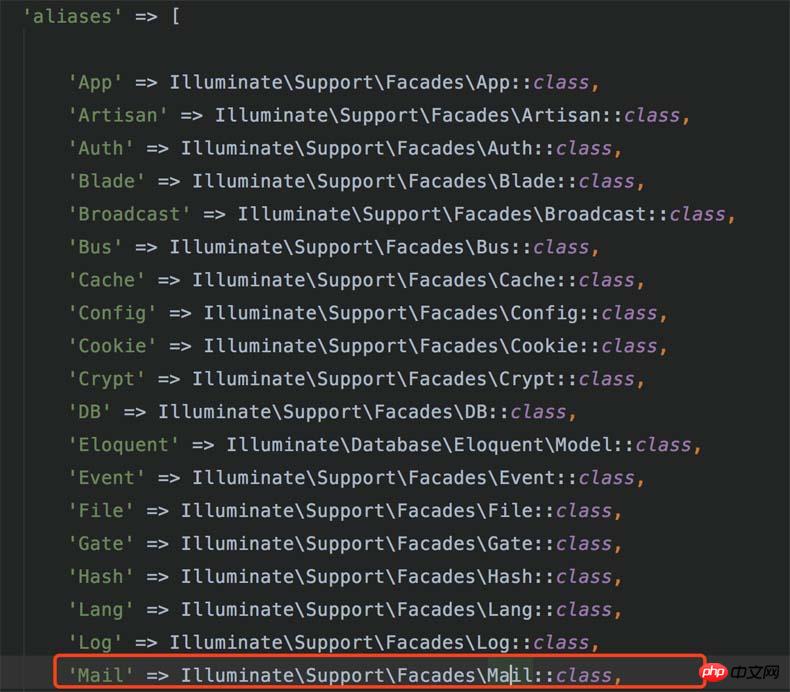
5.3. If you call it The send method, if it does not exist, will enter the callstatic's 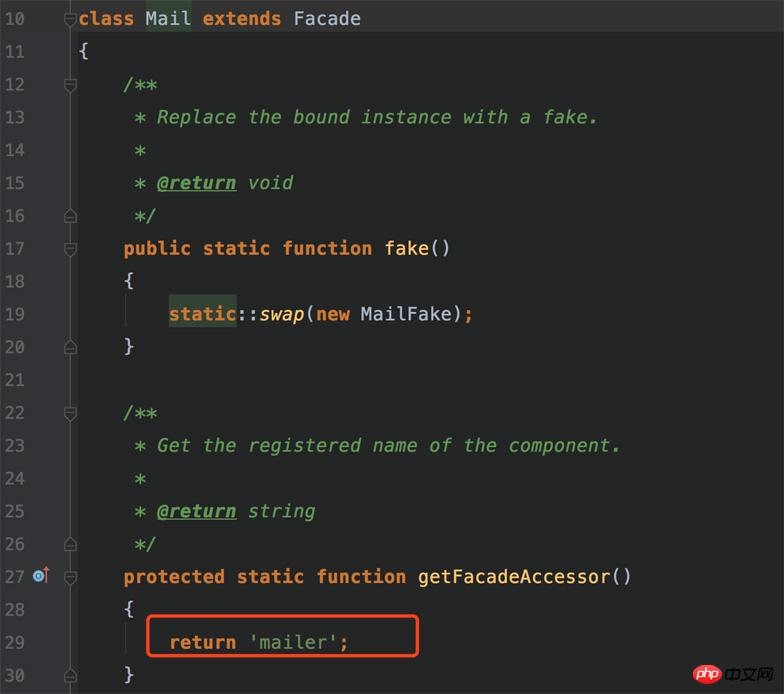 magic method
magic method
5.4、这个方法会得到mailer的实例,即app('mailer')
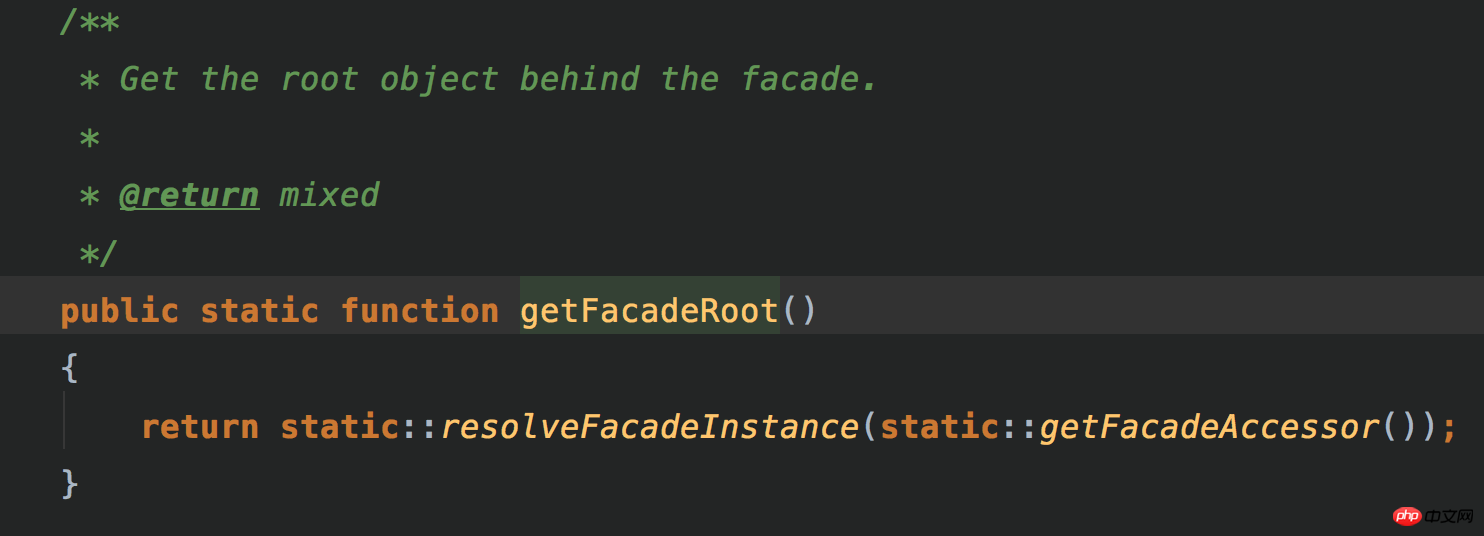
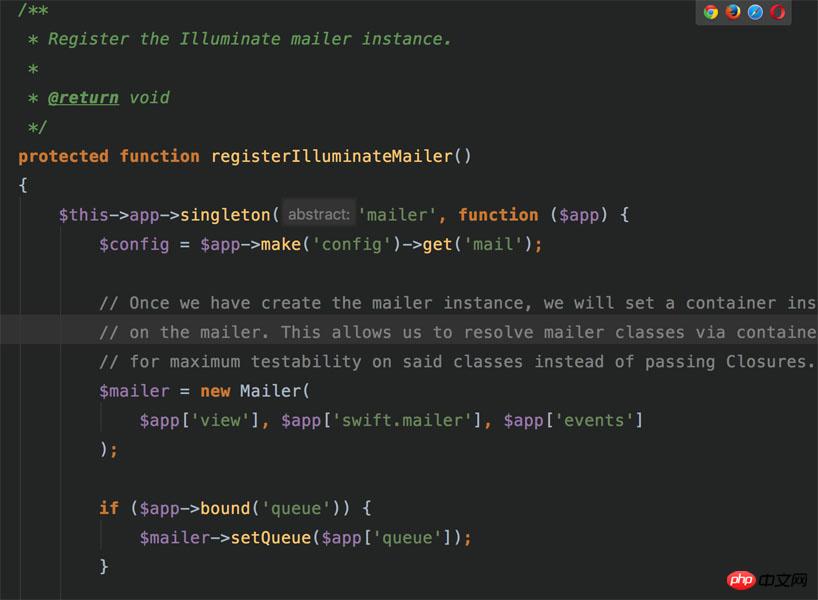
5.5、这个实例便能调用mailer类的send方法
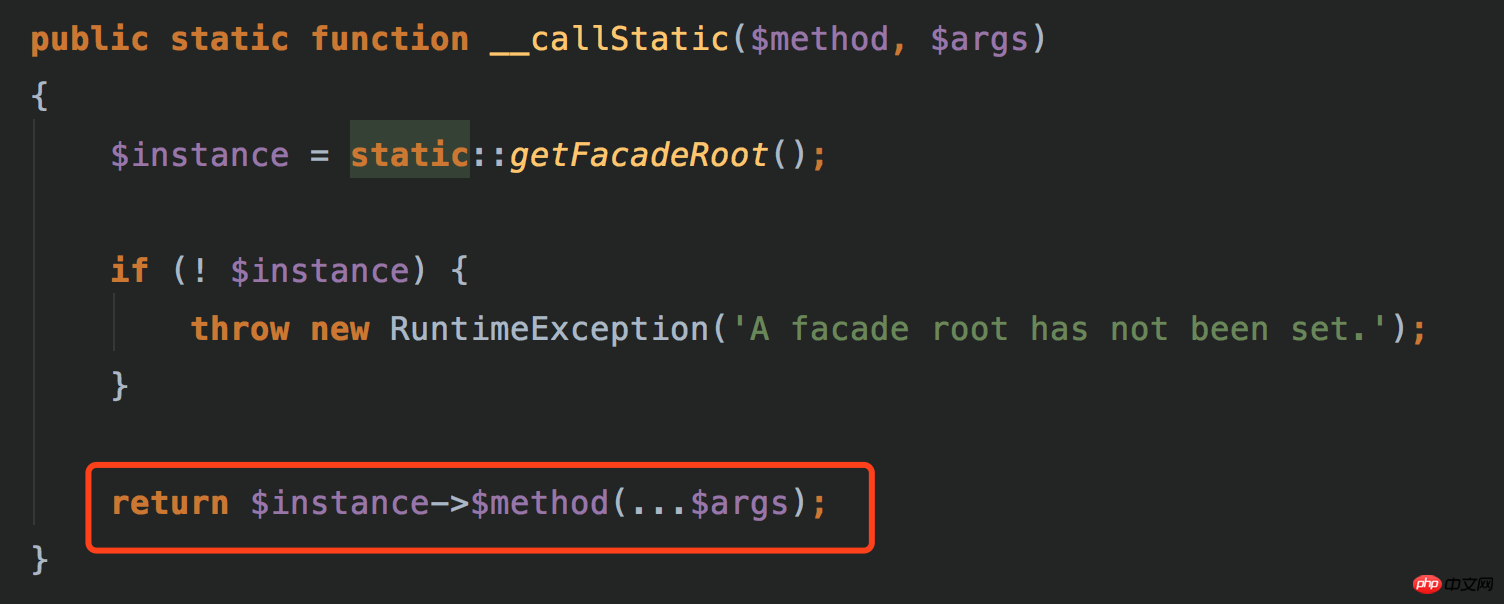
6、契约
Laravel 的契约是一组定义框架提供的核心服务的接口。例如,Illuminate\Contracts\Queue\Queue契约定义了队列任务所需的方法,而Illuminate\Contracts\Mail\Mailer契约定义了发送电子邮件所需的方法。框架对每个契约都提供了相应的实现。
好处是实现了程序的低耦合和简单性。
低耦合#
首先,让我们来看一些高耦合缓存实现的代码。如下:
1 2 3 4 5 6 7 8 9 10 11 12 13 14 15 16 17 18 19 20 21 22 23 24 25 26 27 28 29 30 31 |
|
这个类中,程序跟给定的缓存实现高耦合。因为我们依赖于一个扩展包的特定缓存类。一旦这个扩展包的 API 被更改了,我们的代码就必须跟着改变。
同样的,如果我们想要将底层的的缓存技术( Memcached )替换为另一种缓存技术( Redis ),那又得再次修改这个repository类。而repository类不应该了解太多关于谁提供了这些数据或是如何提供的等等。
比起上面的做法,我们可以使用一个简单的、与扩展包无关的接口来改进我们的代码:
1 2 3 4 5 6 7 8 9 10 11 12 13 14 15 16 17 18 19 20 |
|
相信看了本文案例你已经掌握了方法,更多精彩请关注php中文网其它相关文章!
推荐阅读:
The above is the detailed content of Detailed explanation of the use of Laravel 5.5 core architecture. For more information, please follow other related articles on the PHP Chinese website!

Hot AI Tools

Undresser.AI Undress
AI-powered app for creating realistic nude photos

AI Clothes Remover
Online AI tool for removing clothes from photos.

Undress AI Tool
Undress images for free

Clothoff.io
AI clothes remover

Video Face Swap
Swap faces in any video effortlessly with our completely free AI face swap tool!

Hot Article

Hot Tools

Notepad++7.3.1
Easy-to-use and free code editor

SublimeText3 Chinese version
Chinese version, very easy to use

Zend Studio 13.0.1
Powerful PHP integrated development environment

Dreamweaver CS6
Visual web development tools

SublimeText3 Mac version
God-level code editing software (SublimeText3)

Hot Topics
 Laravel Eloquent ORM in Bangla partial model search)
Apr 08, 2025 pm 02:06 PM
Laravel Eloquent ORM in Bangla partial model search)
Apr 08, 2025 pm 02:06 PM
LaravelEloquent Model Retrieval: Easily obtaining database data EloquentORM provides a concise and easy-to-understand way to operate the database. This article will introduce various Eloquent model search techniques in detail to help you obtain data from the database efficiently. 1. Get all records. Use the all() method to get all records in the database table: useApp\Models\Post;$posts=Post::all(); This will return a collection. You can access data using foreach loop or other collection methods: foreach($postsas$post){echo$post->
 Laravel Introduction Example
Apr 18, 2025 pm 12:45 PM
Laravel Introduction Example
Apr 18, 2025 pm 12:45 PM
Laravel is a PHP framework for easy building of web applications. It provides a range of powerful features including: Installation: Install the Laravel CLI globally with Composer and create applications in the project directory. Routing: Define the relationship between the URL and the handler in routes/web.php. View: Create a view in resources/views to render the application's interface. Database Integration: Provides out-of-the-box integration with databases such as MySQL and uses migration to create and modify tables. Model and Controller: The model represents the database entity and the controller processes HTTP requests.
 Solve caching issues in Craft CMS: Using wiejeben/craft-laravel-mix plug-in
Apr 18, 2025 am 09:24 AM
Solve caching issues in Craft CMS: Using wiejeben/craft-laravel-mix plug-in
Apr 18, 2025 am 09:24 AM
When developing websites using CraftCMS, you often encounter resource file caching problems, especially when you frequently update CSS and JavaScript files, old versions of files may still be cached by the browser, causing users to not see the latest changes in time. This problem not only affects the user experience, but also increases the difficulty of development and debugging. Recently, I encountered similar troubles in my project, and after some exploration, I found the plugin wiejeben/craft-laravel-mix, which perfectly solved my caching problem.
 Laravel user login function
Apr 18, 2025 pm 12:48 PM
Laravel user login function
Apr 18, 2025 pm 12:48 PM
Laravel provides a comprehensive Auth framework for implementing user login functions, including: Defining user models (Eloquent model), creating login forms (Blade template engine), writing login controllers (inheriting Auth\LoginController), verifying login requests (Auth::attempt) Redirecting after login is successful (redirect) considering security factors: hash passwords, anti-CSRF protection, rate limiting and security headers. In addition, the Auth framework also provides functions such as resetting passwords, registering and verifying emails. For details, please refer to the Laravel documentation: https://laravel.com/doc
 Laravel's geospatial: Optimization of interactive maps and large amounts of data
Apr 08, 2025 pm 12:24 PM
Laravel's geospatial: Optimization of interactive maps and large amounts of data
Apr 08, 2025 pm 12:24 PM
Efficiently process 7 million records and create interactive maps with geospatial technology. This article explores how to efficiently process over 7 million records using Laravel and MySQL and convert them into interactive map visualizations. Initial challenge project requirements: Extract valuable insights using 7 million records in MySQL database. Many people first consider programming languages, but ignore the database itself: Can it meet the needs? Is data migration or structural adjustment required? Can MySQL withstand such a large data load? Preliminary analysis: Key filters and properties need to be identified. After analysis, it was found that only a few attributes were related to the solution. We verified the feasibility of the filter and set some restrictions to optimize the search. Map search based on city
 Laravel and the Backend: Powering Web Application Logic
Apr 11, 2025 am 11:29 AM
Laravel and the Backend: Powering Web Application Logic
Apr 11, 2025 am 11:29 AM
How does Laravel play a role in backend logic? It simplifies and enhances backend development through routing systems, EloquentORM, authentication and authorization, event and listeners, and performance optimization. 1. The routing system allows the definition of URL structure and request processing logic. 2.EloquentORM simplifies database interaction. 3. The authentication and authorization system is convenient for user management. 4. The event and listener implement loosely coupled code structure. 5. Performance optimization improves application efficiency through caching and queueing.
 Laravel framework installation method
Apr 18, 2025 pm 12:54 PM
Laravel framework installation method
Apr 18, 2025 pm 12:54 PM
Article summary: This article provides detailed step-by-step instructions to guide readers on how to easily install the Laravel framework. Laravel is a powerful PHP framework that speeds up the development process of web applications. This tutorial covers the installation process from system requirements to configuring databases and setting up routing. By following these steps, readers can quickly and efficiently lay a solid foundation for their Laravel project.
 How to learn Laravel How to learn Laravel for free
Apr 18, 2025 pm 12:51 PM
How to learn Laravel How to learn Laravel for free
Apr 18, 2025 pm 12:51 PM
Want to learn the Laravel framework, but suffer from no resources or economic pressure? This article provides you with free learning of Laravel, teaching you how to use resources such as online platforms, documents and community forums to lay a solid foundation for your PHP development journey from getting started to master.





